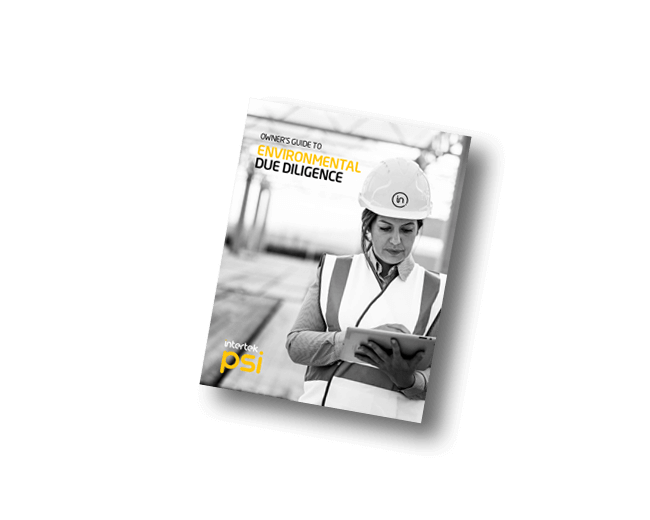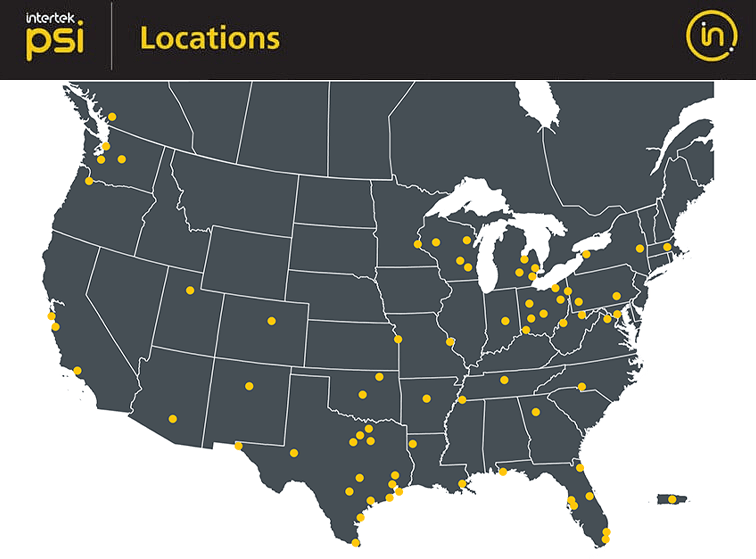Environmental Assurance in Real Estate Transactions
Real estate investors, business owners, law firms and insurance companies all have an interest in the success of real estate transactions and the transfer of properties, building assets, new developments and vacant or abandoned redevelopments. Intertek-PSI’s environmental due diligence solutions evaluate the environmental risks associated with a property by assessing historical records, current property conditions, adjoining properties and environmental regulatory databases with additional capabilities for site investigations, contamination assessments and remediation.
In due diligence, historical reviews, initial site visits or property condition assessments can identify potential environmental hazards like asbestos containing building materials, mold, moisture, lead-based paint, contaminants, and pollutants that can put people at undo risk of injury, illness, or negative impacts on their overall well-being.
Our due diligence offerings are a combination of our environmental, geotechnical, materials testing and building science capabilities to form a complete customizable solution for your next property transaction, acquisition, or development.
Third Party Reviews
Serving as an independent third-party reviewer, Intertek-PSI can provide additional environmental assurance on environmental risk assessments and remediation plans. By reviewing existing reports and findings, providing oversight, or recommending additional or alternative solutions, we can identify, mitigate, or outright avoid potential environmental risks, compliance issues and costly liabilities from concerns not called out by those directly involved in the transaction.
Phase I Environmental Site Assessments
Phase I Environmental Site Assessments (ESAs) are undertaken to determine the potential of a specific property for environmental hazards and regulatory concerns. The assessment includes site reconnaissance of the subject property and adjoining properties, historical records reviews, interviews of those with knowledge about the property, and a review of environmental regulatory databases. Our site assessments can also be supplemented with additional environmental services such as radon testing or asbestos management services. If there is a reasonable suspicion of an environmental concern, then we typically recommend a Phase II Environmental Site Assessment to further evaluate the site’s condition.
On a national basis, Intertek-PSI completes over 5,000 Phase I ESAs annually and by developing our own standard processes and reporting formats, we have come to improve efficiency and reduce project costs and turnaround time.
Phase II Environmental Site Assessments
Phase II ESAs are typically conducted when a Phase I assessment has identified potential environmental concerns on a specific property. Phase II ESAs provide further geo-environmental site investigation to verify the presence of the suspected concerns and determine the nature, extent, and source of contamination.
The scope of a phase II assessment is extremely site‐specific, and generally based on the findings of the phase I report. Our Phase II projects start off with a sampling site plan which outlines the locations and processes for sample collection, field handling, preservation, and transportation. A typical Phase II ESA might include: soil vapor surveys, hazardous waste characterization, sampling and analysis of soil, groundwater, drinking water, and suspected lead paint, asbestos containing materials and radon levels.
The Phase II ESA’s final report is a contamination assessment consistent with the requirements of the applicable regulatory agencies and typically includes a site characterization, summary and analysis of testing reports and findings, a risk assessment, and recommendations and estimated costs for remediation, monitoring, and management.
Property Condition Assessments (PCAs)
Property Condition Assessments assess and report on the current condition of building components and building systems that include HVAC, electrical, plumbing, and roofing. PCA reports provide a list of facility components in poor condition and estimated costs to correct the deficiencies. PCAs are often conducted at the same time as Phase I Environmental Site Assessments to provide the potential buyer a comprehensive evaluation of the property and an understanding of the potential risks, future liabilities, and capital expenditures.
Probable Maximum Loss (PLM) Assessments
Probable Maximum Loss (PLM) assessments are detailed site and building studies used to create a risk profile and calculate the probable maximum loss estimate. The first stage of the assessment evaluates the property's proximity to fault lines and factor the potential strength of future seismic events. Next, the building design and site properties are evaluated for their resiliency to those seismic factors and used to develop an estimate to restore the site to pre-event conditions. These assessments are often required by lenders in regions with seismic concerns and are commonly paired with Property Condition Assessments to determine the building's overall condition.
Knowledge Center
Building Health & Wellness: An Overview of Services
Acoustical Testing & Consulting Resources
Remote Pre Inspections for NFPA 80 / 101
Protek - Safety. Everywhere. Every Day
Fire Doors 101: Your Guide to Testing and Certification - Webinar Recording
Tornado Testing & Certification Requirements - Webinar Recording
Plumbing Products Testing & Certification - Webinar Recording
The Evolving Code Evaluation Process White Paper
Proposition 65 & the Furniture Industry Webinar Recording
Why Planning for FCC Certification is Key to Success in the Door Hardware Industry White Paper

Upcoming Tradeshows & Events
Resources
- Search and Buy Building & Construction Standards
- SpecDirect
- Building Products Directory
- Project Connect (formerly myATI) – B&C Products
- Construction Hive – B&C Projects (PSIQest)
- My TestCentral


